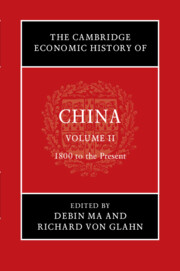Book contents
- The Cambridge Economic History of China
- The Cambridge Economic History of China
- The Cambridge Economic History of China
- Copyright page
- Contents
- Figures
- Maps
- Tables
- Contributors to Volume II
- Acknowledgments
- Note on Citations
- Introduction to Volume II
- Part I 1800–1950
- Part II 1950 to the Present
- 15 The Origin of China’s Communist Institutions
- 16 China’s Struggle with the Soviet Growth Model, 1949–1978
- 17 Living Standards in Maoist China
- 18 The Political Economy of China’s Great Leap Famine
- 19 China’s External Economic Relations during the Mao Era
- 20 The Chinese Economy in the Reform Era
- 21 China’s Great Boom as a Historical Process
- Index
- References
19 - China’s External Economic Relations during the Mao Era
from Part II - 1950 to the Present
Published online by Cambridge University Press: 07 February 2022
- The Cambridge Economic History of China
- The Cambridge Economic History of China
- The Cambridge Economic History of China
- Copyright page
- Contents
- Figures
- Maps
- Tables
- Contributors to Volume II
- Acknowledgments
- Note on Citations
- Introduction to Volume II
- Part I 1800–1950
- Part II 1950 to the Present
- 15 The Origin of China’s Communist Institutions
- 16 China’s Struggle with the Soviet Growth Model, 1949–1978
- 17 Living Standards in Maoist China
- 18 The Political Economy of China’s Great Leap Famine
- 19 China’s External Economic Relations during the Mao Era
- 20 The Chinese Economy in the Reform Era
- 21 China’s Great Boom as a Historical Process
- Index
- References
Summary
When considering the question of China’s external economic relations during the Mao era, the dominant narrative in the literature underscores the following view: Mao’s China pursued a foreign economic policy that was autarkic, isolated from the global economy, and locked into a Soviet-inspired planned economy that provided limited incentives for economic interdependence with the outside world. For some, China’s isolation from the global economy was the result of its position in the Soviet bloc, which was “heavily biased against foreign trade,” and from its adoption of a centrally planned, socialist economic model that prohibited private interests from pursuing foreign investment or trade. For others, Mao-era policies of autarky were inspired by a form of xenophobia that stemmed from the country’s experience of Western predations during the nineteenth century, resulting in fear of economic dependence on foreign powers. Finally, others emphasize the role of Mao’s revolutionary ideology in explaining China’s isolation from the global economy; Mao’s tendency to view major international economic institutions and norms as counterrevolutionary and “hostile” to the Chinese state led him to disengage from international trade and other economic opportunities.
Keywords
- Type
- Chapter
- Information
- The Cambridge Economic History of China , pp. 685 - 721Publisher: Cambridge University PressPrint publication year: 2022



